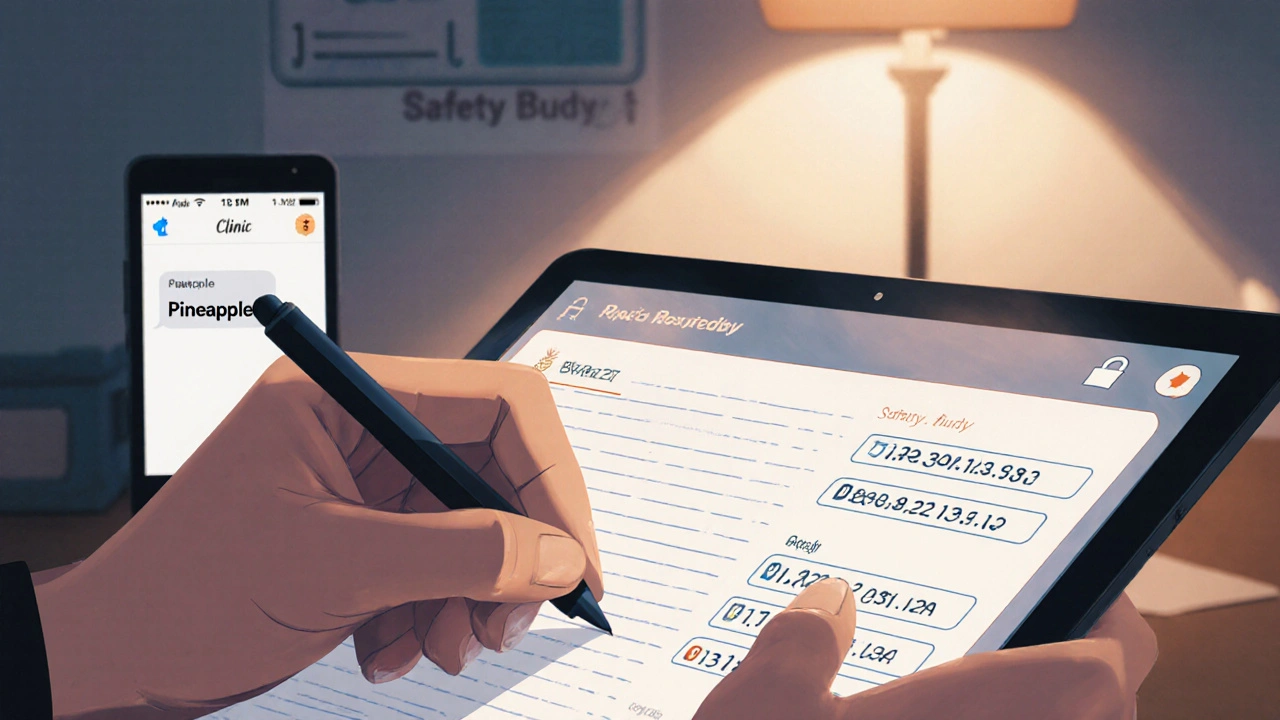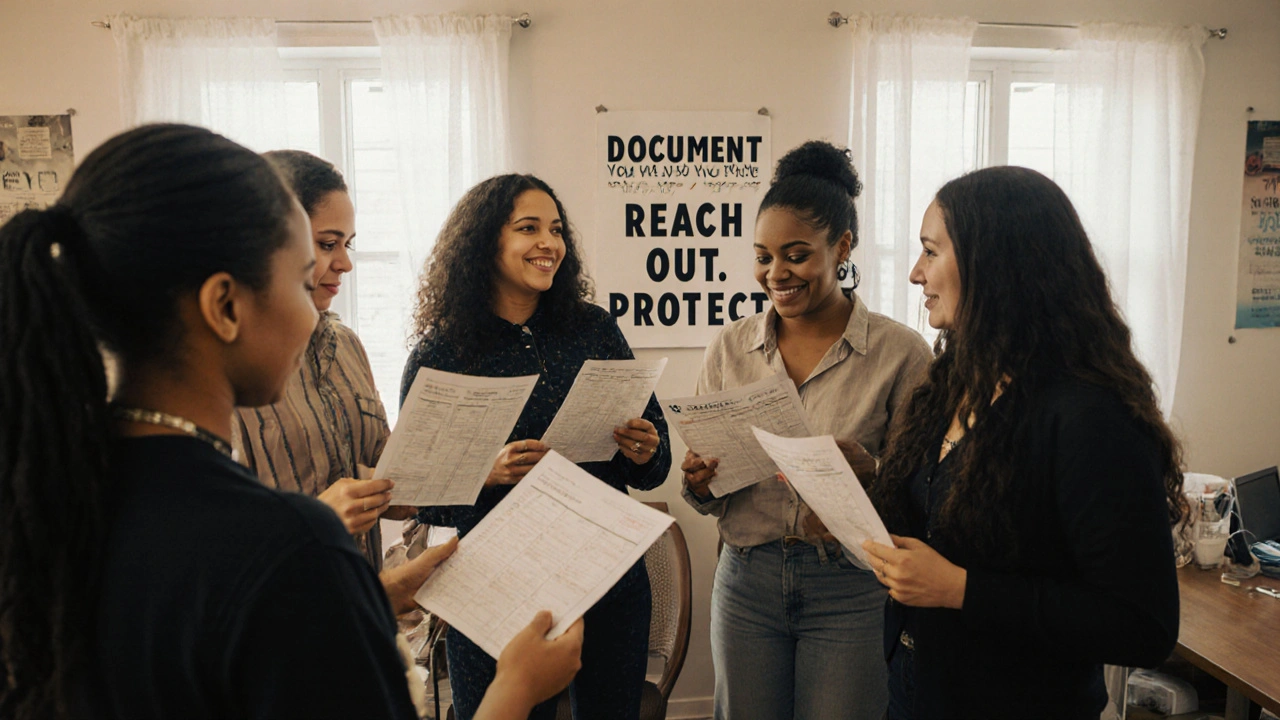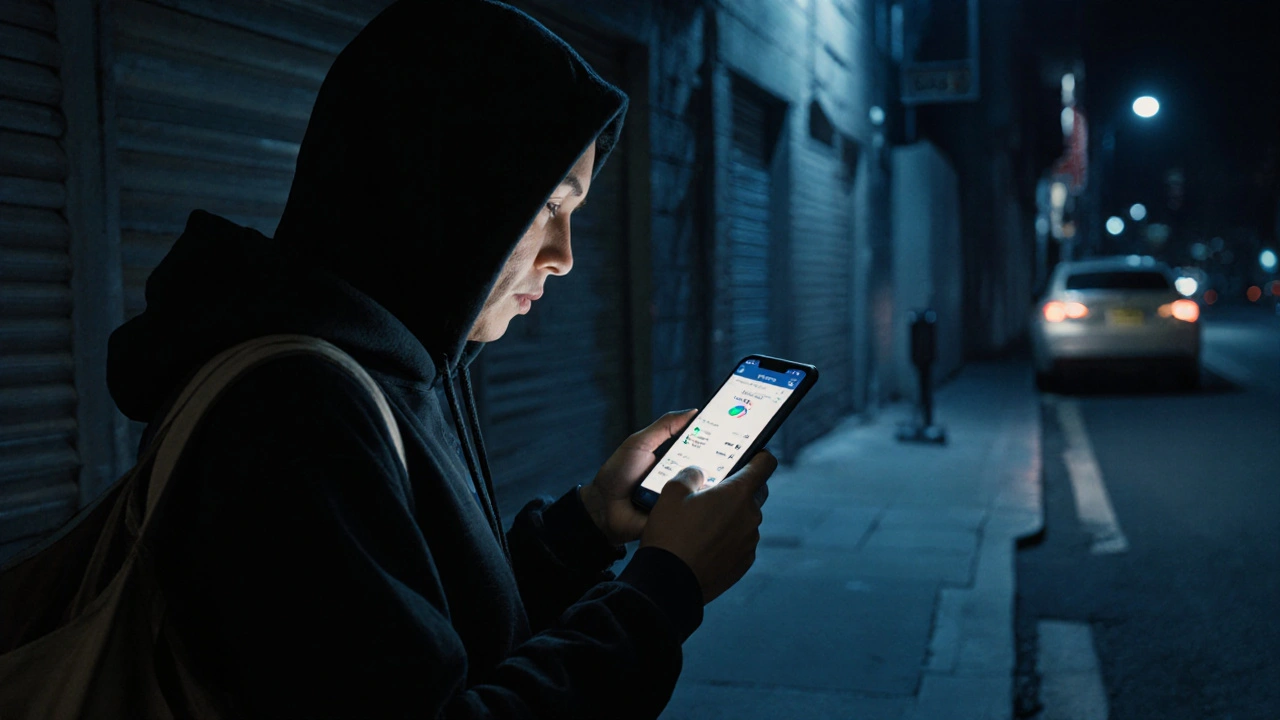Sex work is dangerous. Not because of the work itself, but because of the laws, stigma, and lack of protection that make it so. Every day, sex workers face threats, assaults, and even murder-and too often, the police won’t help, or worse, they’re the ones causing harm. But documenting violence and reaching out for support isn’t just possible-it’s critical. And there are real, practical ways to do it safely.
Why Documentation Matters
If you’re attacked, threatened, or robbed, having a record changes everything. It’s not about proving you’re "worthy" of help. It’s about proving what happened. Without documentation, your story becomes easy to ignore. Police may dismiss it. Shelters may turn you away. Courts may not take it seriously.
But when you have timestamps, names, license plates, screenshots, or even voice memos, you turn a word against a person into evidence against a pattern. In 2024, a group of sex workers in Toronto used documented reports to push for a city-wide safety protocol. It wasn’t perfect-but it got them meetings with city officials and a hotline specifically for sex workers.
You don’t need to be a journalist. You don’t need to go public. You just need to keep a record.
How to Document Safely
Documentation has to be secure. If your phone is seized, your messages are read, or your location is tracked, your safety could be at risk. Here’s how to do it without putting yourself in more danger.
- Use encrypted apps like Signal to store text logs. Message yourself: "Client #45 came at 10:15 PM. Said he’d pay $200, then grabbed my arm when I refused anal. Left at 11:02 PM."
- Record audio on your phone. Even if you don’t speak, just press record when you feel uneasy. Background noise, car engines, or silence can later help confirm time and place.
- Take photos of license plates, tattoos, scars, or clothing-without showing your face. Use the camera’s date stamp. If you can’t take a photo, write down details immediately after: "White sedan, NY plates, 3rd digit is 7, driver had a tattoo of a snake on his left forearm."
- Use a password-protected app like Standard Notes or Obsidian. Don’t store logs in Notes or Google Docs. Those can be accessed remotely if your device is hacked or seized.
- Back up to a trusted person-not a partner, not a roommate. Someone who won’t panic or betray you. Send them encrypted files weekly. If you disappear, they have your history.
Some sex workers use a "safety buddy" system: two people check in every hour. One sends a code word: "Pineapple" means everything’s fine. "Banana" means I need help. If you don’t check in, your buddy calls a local org or the police.
Who Can You Trust?
Police? Often not. In many cities, sex workers report being arrested, extorted, or assaulted by officers. But there are people who can help-and they’re not always who you expect.
- Sex worker-led organizations like SWOP (Sex Worker Outreach Project) or Red Umbrella Fund. They don’t report to police. They offer legal referrals, safe housing, trauma counseling, and help filing reports without your name.
- Human rights groups like Amnesty International or Human Rights Watch have documented violence against sex workers for years. They can pressure governments when local systems fail.
- Local clinics that serve marginalized communities. Many offer free forensic exams and will help you file a report anonymously. They’re bound by patient confidentiality.
- Online networks like the Global Network of Sex Work Projects (NSWP). They have regional contacts who can connect you to local support, even if you’re in a country where sex work is illegal.
Don’t wait for someone to "fix" things for you. Find the people who’ve been through it. They know what works.

When to Report-And When Not To
Not every incident needs police. Sometimes, reporting makes things worse. Here’s how to decide:
- Report if: You were physically injured, kidnapped, threatened with a weapon, or if the same person has targeted others. Documented cases like these can trigger investigations.
- Don’t report if: The person is a client who refused to pay, yelled at you, or touched you without consent but didn’t harm you physically. In many places, reporting this leads to you being charged instead of them.
There’s no shame in choosing safety over justice. Your life comes first.
What to Say When You Reach Out
If you’re ready to contact support, here’s a script that works:
"I’m a sex worker. I experienced violence on [date] at [location]. I have documentation: audio, notes, photos. I don’t want to press charges yet, but I need help staying safe. Can you help me file a report without my name? Or connect me to a lawyer?"
That’s it. You don’t need to explain your whole life. You don’t need to beg. You’re not asking for permission. You’re asking for resources.
Organizations hear this all the time. They know what to do.
What Happens After You Report?
If you file with a sex worker org, they’ll:
- Give you a case number (not tied to your identity)
- Store your documentation securely
- Help you get medical care or counseling
- Connect you with others who’ve had similar experiences
- Advocate for you with police-if you choose to go that route
If you file with police, expect delays, skepticism, and possible arrest. But if you’ve documented everything, you can push back. Say: "I’m not here to be charged. I’m here to report a crime. Here’s my evidence. I want to know what happens next."
Some cities now have special units for vulnerable populations. Ask: "Do you have a liaison for sex workers?" If they say no, ask for the name of the person who handles domestic violence cases. Sometimes, they’re more willing to help.

Building a Personal Safety Plan
Documentation is one tool. A safety plan is the whole system.
Every sex worker should have a written plan. Keep it in an encrypted file, and give a copy to your safety buddy. Include:
- Your daily schedule: times you work, locations, routes
- Emergency contacts: who to call, who to text
- Safe places: clinics, libraries, 24-hour stores where you can go if you’re scared
- Code words: for friends, for clients, for police
- What to do if you’re detained: "I’m a sex worker. I have documentation. I need a lawyer. I’m not consenting to a search."
Update it every month. Things change. So should your plan.
You’re Not Alone
There are thousands of sex workers who’ve been through this. Some are in jail. Some are dead. But many are alive-and they’re still fighting. They’ve built networks, apps, hotlines, and safe houses because no one else would.
You don’t have to be brave. You just have to be smart.
Document. Reach out. Protect yourself. Repeat.
The system won’t save you. But you don’t need the system to survive. You need information. You need community. And you already have the power to use both.
Can I report violence without giving my real name?
Yes. Many sex worker organizations and some police units allow anonymous reporting. You can file a report using a pseudonym or case number. Your documentation (audio, photos, timestamps) is what matters-not your name. Organizations like SWOP and NSWP can help you file without revealing your identity.
What if the police are the ones who hurt me?
If you’re assaulted by police, document everything: time, badge number, vehicle, location, witnesses. Contact a human rights group like Amnesty International or a local sex worker collective. They can help you file a complaint with internal affairs or an independent oversight body. Don’t rely on the same department that harmed you. Your safety comes first-leave the area if you can, and reach out to trusted networks immediately.
Is it safe to use my phone for documentation?
It can be-if you take precautions. Use encrypted apps like Signal or Standard Notes. Don’t store logs in cloud services tied to your identity. Turn off location services when documenting. Use a burner phone if possible. If you’re worried about being tracked, leave your phone at a safe location and use a public computer to send encrypted files to a trusted contact.
What if I’m in a country where sex work is illegal?
You still have rights. International organizations like the Global Network of Sex Work Projects (NSWP) have local partners who offer support without reporting you to authorities. They can help you access medical care, legal advice, or safe housing-even in countries where sex work is criminalized. Your documentation can still be used to pressure governments or international bodies for change.
How do I find a sex worker-led organization near me?
Start with the Global Network of Sex Work Projects (NSWP) website-they list member organizations by country. You can also search for "sex worker collective" + your city. Many operate through encrypted messaging apps like Signal or Telegram. Don’t use Google or social media to search-use a VPN or public library computer if you’re concerned about tracking.
Next Steps
If you’re reading this and you’re safe right now, take five minutes. Open Signal. Type one sentence: "I’m documenting my safety." Save it. That’s your first step.
Then find one organization that supports sex workers. Text them. Ask: "Can you help me document violence safely?" No one will judge you. They’ve heard it all before.
You don’t need permission to survive. You just need to act.
